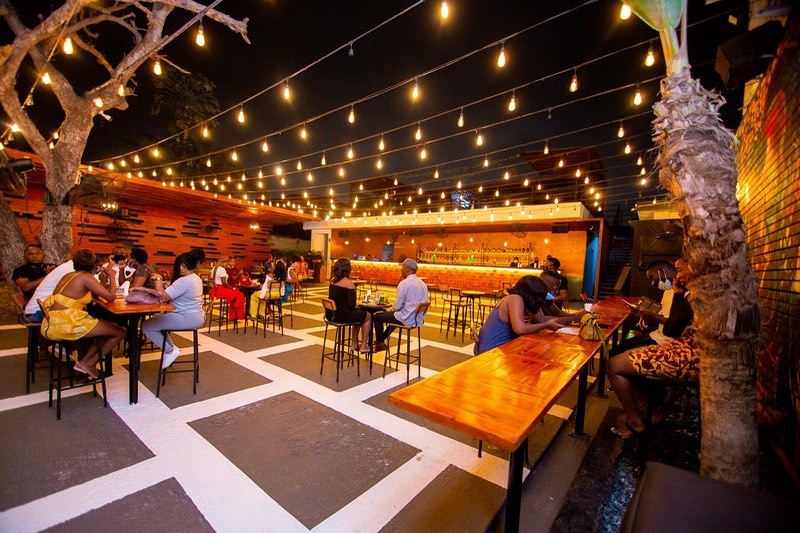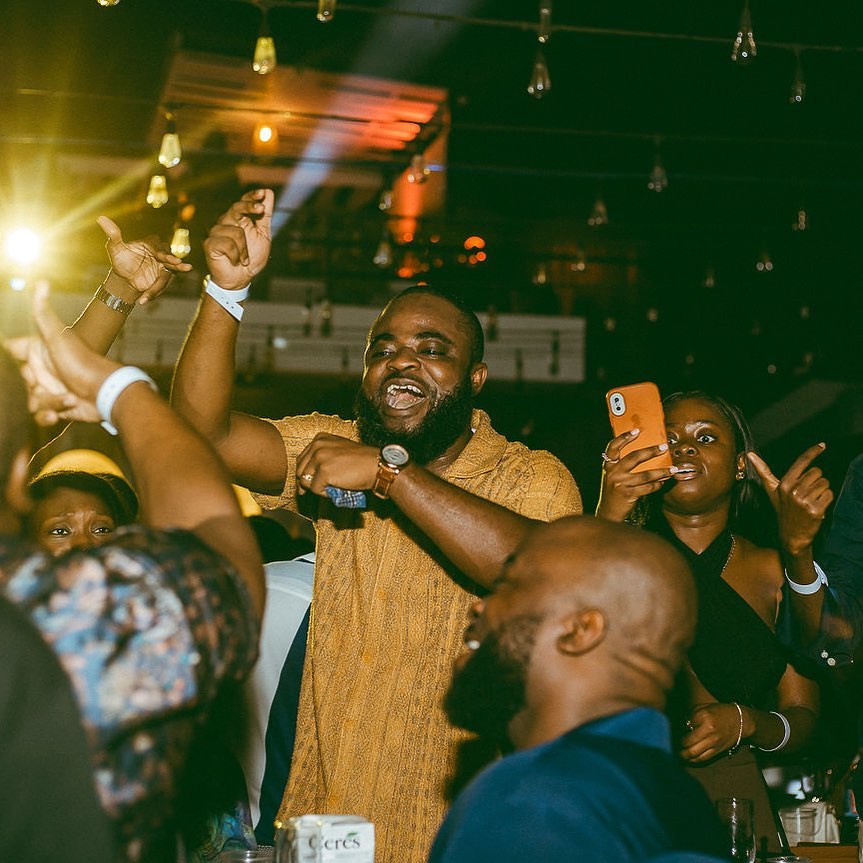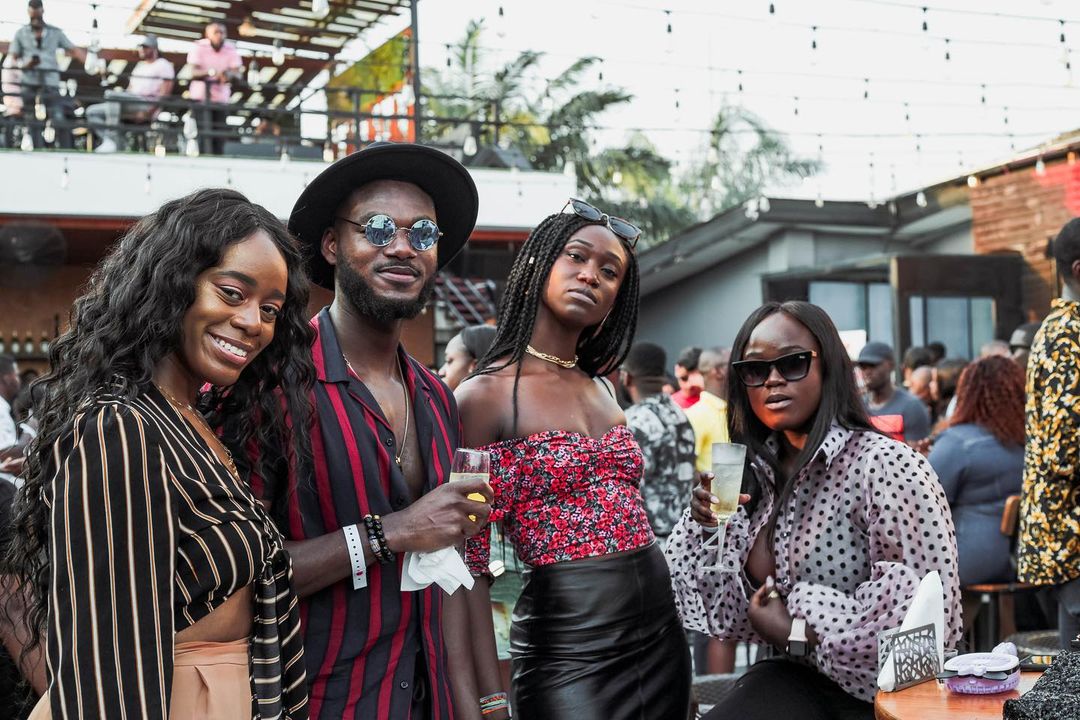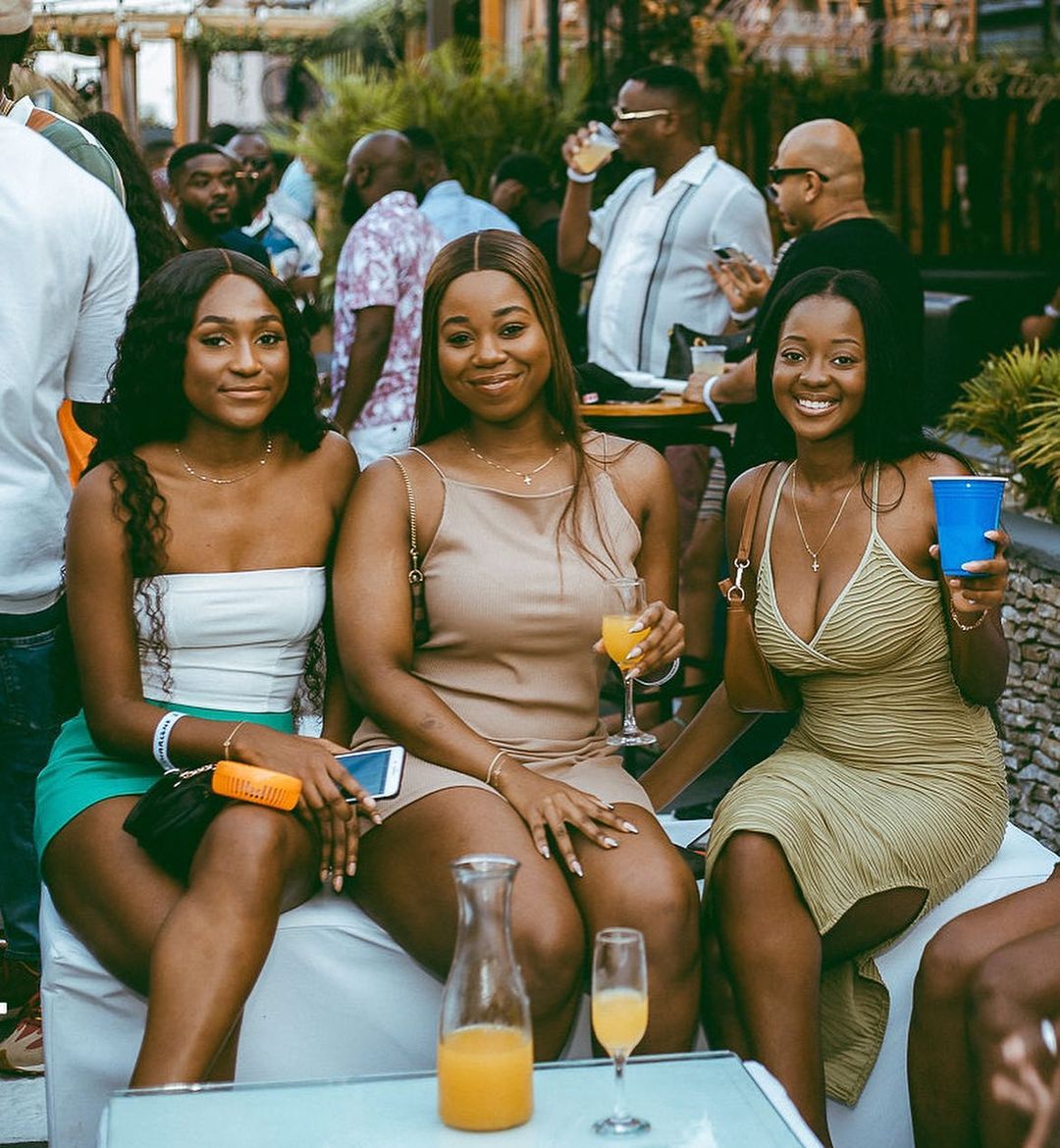NATIVE Exclusive: Kofi Adjei Maafo & Keith Edem Aweke’s Have Grand Plans for Ghana’s Hospitality Scene
“It is one of our dreams to help change the narrative of the industry."
“It is one of our dreams to help change the narrative of the industry."
Founded in 2017, Bloom Bar is one of the popular nightlife hotspots in Ghana’s capital, Accra. The open-air space, which caters to both Ghanaians and foreigners, is renowned for its expert cocktails and African-inspired ambience. Last year, in December, Bloom Bar’s owners, Kofi Adjei Maafo and Keith Edem Aweke, celebrated the outfit’s fifth anniversary and launched its new brand BlueChip Hospitality.
“I love the whole idea of cooking up experiences to entertain people,” Maafo shares with the NATIVE. “I like to create spaces and concepts, whereas Edem has always had the interest of curating the drinks and services and the food that people enjoy when we create these concepts.” While in university, he and Aweke organised parties for their friends and would eventually make a big splash when they hosted their biggest party (a glow-in-the-dark party) at a lounge in Ghana. Noting their success, the duo decided to venture full-time into the hospitality business.
“I took programs and courses in pyrotechnics [and] I studied more about how to enhance experiences through the concepts and shows I had worked on in my line of work,” Maafo says. At that time, Aweke was in the United States, where he went to a culinary school and also did a mixology program. He would go on to work in the New York scene as a mixologist and became a head bartender at Havana Central, a rum-based bar located in downtown Manhattan. “We at one point just felt like Ghana needed a new level of experience,” Maafo adds, “and with him having a proper idea on how operations are run, we cooked the concept up, looked at the advantages of what we’re going to bring, studied a few things on the Ghanaian nightlife then and realized that we could bring something to enhance the nightlife. And then the journey started with what we see today.”
One of the things Maafo and Aweke observed before starting Bloom Bar was that most of the businesses in the hospitality scene—bars, restaurants and hotels—in Ghana were owned by foreigners. This meant that the scene didn’t inculcate African sensibilities into modern concepts and that there weren’t enough models for young Ghanaians who wanted to own businesses to follow. “When we came in, we were pioneers and [created] systems when systems were not there,” Aweke says. “We tried to create a space for ourselves. It was a space for young people, where young people could feel comfortable. It was the modern Ghanaian hospitality, that’s how I’d term it.”

It is the constant drive to excel and build efficient systems that have resulted in the birth of BlueChip Hospitality, a hospitality management company that oversees the affairs of Aweke and Maafo’s Bloom Bar, East End Bistro and Big Leagues Sports Bar, as well as offer business conceptualisation (development, startup and growth), construction (mortgage review, contracting, design), menu development and curation, staff recruitment, hiring and training, and operations management and setup.
“We came into a system where, if you want to even grow as a bar, you had a problem because you needed banks or a solid system in terms of government laws, taxes and a financial system to support a business growth,” says Maafo. “Now, the economy did not really regard tourism and hospitality as a sector to prioritise, and until they saw some level of seriousness or some systems in place, I don’t think anyone was going to regard our industry. So coming in there, we realised that a lot of people would do the business and would take it on as a hobby. They would do the business and take it on as something they are just doing, but not necessarily to grow and take the industry to the next level. So we asked ourselves the question, ‘How are we going to create a system for everyone who wants to come in to be able to help the industry grow?’—because we couldn’t do it alone. That was one and [secondly], how do we also create that reputation and recognition for what we are going to do?”
To increase the appeal of their businesses to investors, Aweke and Maafo worked on their branding, increased and trained their workforce—which rose from 8 to 122 people—and ensured that their books were in order. “When the banks and the big brands started to see the profile and started to see that we were really making some social impact, it started to change the narrative,” Maafo says. Their efforts were also bolstered by the resounding success of Ghana’s Year of Return campaign.

In 2018, Ghana’s Nana Akufo-Addo-led government, along with US-based Adinkra Group, launched the Year of Return, Ghana 2019 initiative to encourage African Americans and the African Diaspora to seek Ghana as a travel destination and also invest in the country and the African continent. The year 2019 was significant because it marked 400 years since enslaved Africans arrived in the United States. Since its launch, the campaign has attracted famous names to Ghana: Idris Elba, Naomi Campbell, Cardi B, Steve Harvey and Jidenna, among others.
“We were fortunate to have positioned ourselves and take advantage of that position by giving people that vibe [of quality Ghanaian culture and nightlife services] through whatever we offer,” Maafo says. “So we didn’t necessarily have to reach out to people to come into the space, but we did our marketing. We obviously gave a service offering and people came. People came because they had heard. They had seen. And it was also thanks to social media and people curating their reels and stories for people to see and just drive a lot of people into the space during moments where they came to enjoy Ghana.”
Bloom Bar has played host to top music/entertainment industry folks from Burna Boy, Wizkid, Davido, Jidenna, Chance the Rapper, Vic Mensa, Rema, Ayra Starr to Micheal Blackson. Last year, Maafo and Aweke curated Afrochella’s Official Afterparty, Everyday People x Ghana Edition, London’s DLT Brunch, a D’usse Day Party, Mr Eazi’s Detty Rave and King Promise’s Promiseland concert. In January, they had a hand in the Black Star Line Festival, which was hosted by Chance the Rapper and Vic Mensa.

For Aweke, the union of music and the hospitality business is a no-brainer. He says music is used to highlight the Ghanaian and African cultures and also create opportunities for the works of artists to reach new audiences. Maafo adds that beyond the music, every other aesthetics was taken into consideration. “When we first set out to do this whole hospitality journey, there were things that I always identified as experience determinants. And I did that by looking at how I could engage the senses of people when they come into a space – the five senses,” Maafo says. “So we considered what people see when they come into your space and even what they touch when they come there. The chair, how it feels, what you are sitting on. All of these things were considered.

“So when it came to music, we were very specific because we would curate the night in a way that we would put certain type[s] of songs on for the early crowd and we knew how to change it at certain hours to create a vibe. And it was all very deliberate and intentional to give the vibe that you have seen over the years in Bloom [Bar]. To us, the DJs are an integral core part of what we do. We spend time with them on their playlists. We are looking at how we can entertain the crowd, how we can engage them through music, when we want everybody to get out from their chair, how we want them to start playing that kind of songs that would get everybody off their chairs, get them screaming for about 30 minutes and making them calm down in 45 minutes. It’s very intentional. So we do consider music as a serious core part of what we do.”

Aweke states that one of the biggest challenges he and Maafo have faced in the day-to-day running of their businesses is finding the right people to add as staff members and also training them to be suitable for the high level of skill they desire. Another challenge is the erratic nature of the business climate in Ghana and Africa, as a whole. On his part, Maafo believes that the hospitality sector is saturated with businesses that provide the same service. He calls for businesses to come together and have a collective voice to earn negotiating power and raise the standards of the industry. He adds that it would be helpful if the government set up more hospitality-focused training schools as this would fill the industry with more qualified workers and enhance the level of professionalism.
“It is one of our dreams to help change the narrative of the industry and help to actually improve the narrative [and] perception of the business. That’s the first thing,” Maafo says about the aspirations of BlueChip Hospitality. “We wanted to be as attractive as possible, not just to investors, but to the young and up-and-coming students in universities now that it’s an option. It’s an option to set up a restaurant, it is an option to apply for careers that our industry can offer, which is, you know, a lawyer in hospitality, an accountant in hospitality, procurement managers, procurement officers. These are all very interesting careers that are never talked about in the school curriculum [in Ghana]. These are some of the things that we wish to draw awareness to through BlueChip because we have educational programs that we would be running; so these are some of the things that we want to highlight and draw younger generations to and make that impact not just in Ghana but throughout the African region.”
Although BlueChip Hospitality is still in its nascent stage, the lofty aspirations Maafo and Aweke hold for the company are inexhaustible. They are aware that as the years pass, plans are bound to change and require improvement but they are not deterred. “We would love to impact as many businesses as possible with the expertise that we have,” Maafo says. “This year, we are hoping that we can get a number of clients who would want to work with us to help build their businesses, help set up their systems, help train their staff, help build their concepts and then help set a standard for the industry through BlueChip. So for this year, that is what we really would want to work on. Basically, just give back five to six years of experience to anyone that wants to come [into] the industry and help build their businesses, teach them the ways to hustle [and] ultimately be successful in the space.”
Featured image credits/NATIVE

